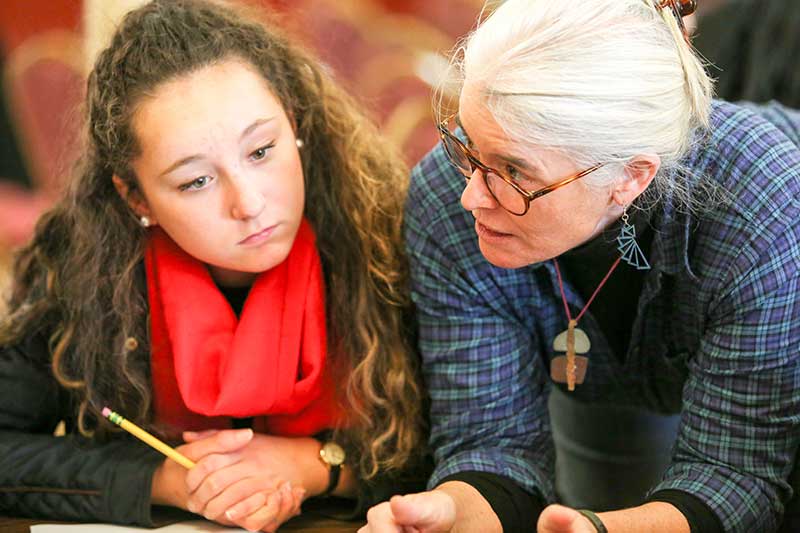The tenth grade class traveled to Philadelphia on November 13 to supplement their studies about 19th century African-American history in the United States.
The first stop on the field trip was the Free Quaker Meeting House, where students simulated a Meeting for Worship for Business to contemplate and debate a problem together, as if they were at 19th century Quaker Meeting. History Teachers Eliza McFeely and Clark Thomson asked the tenth graders to imagine that the year was 1851 and, in the basement of the Meeting House, an escaped slave woman named Harriet and her child have come to the Meeting to ask for help in gaining their freedom. The students read the Fugitive Slave Act of 1850 in history class, which required that all escaped slaves be returned to their owners, and they needed to consider the consequences of following or defying that law in their final decision.
The students sat in silence as they wrestled with the problem, and then began to speak individually to share their thoughts with the Meeting.
Some comments that were brought to the discussion that favored following the law included:
- “Because we know of Harriet’s existence, we are all liable. We can all be charged with aiding and abetting a slave if we do not follow the law.”
- “Although the state of Pennsylvania abolished slavery and Quakers are against slavery, the Fugitive Slave Act is the law, and we must follow it. We must return Harriet to her owner.”
- “If we are found to have shielded Harriet and her child, we will be forced to pay a heavy fine, and that is too much money to ask from our community.”
- “It is the ethical decision to help Harriet, but we all have families. We must think about the consequences for ourselves and our families.”
Other students volunteered arguments for helping Harriet and her child escape from slavery:
- “As a slave, Harriet doesn’t have a voice. We have to stand up and be that voice for her.”
- “As citizens, it is our job to obey the law, but we must also keep in mind the higher law – the law of God.”
- “If we aid the slave woman, we may sacrifice money or our possessions if we are sent to jail, but money and possessions are meaningful only in this life. Our soul remains with us in the afterlife, and I do not want the sin of slavery weighing on my soul.”
- “There is safety in numbers, and if we all work together, we can help her. She can’t do this on her own.”
- “Others are saying we will be responsible for reimbursing lost property, but we must remember that Harriet was never property to begin with. She is a human being just like us, she has rights, and we have the responsibility to protect those without a voice.”
After weighing the advantages and disadvantages of the many potential solutions, the tenth grade class was unable to come to a consensus on what to do, appreciating the real-life challenges that Quakers struggled with in 1851.
The students then visited the Mother Bethel AME Church. At the church, they learned about the history of the building and its founder Richard Allen and toured the church museum. Additionally, the tenth graders had the opportunity to act as historical archivists and decipher some of the church’s primary documents.
“The students will be examining photocopied pages from a ‘Minute and Trial’ book,” said Margaret Jerridou, an archivist at Mother Bethel. “From the 1820s to the 1850s, people in the congregation would be put on trial by powerful church members if someone was reported for misbehavior. The students will help me document when the trials took place, the names of the persons involved, describe the reason why someone was put on trial, and if that person was found guilty or not and what their punishment was.”
The notes of the students’ discoveries were then used by the archivists to contribute to the church’s official historical record.
“Deciphering primary documents is an opportunity for the students to act like historians,” said Mrs. McFeely. “When they are doing research on the Internet for classes, all of the information they find, archivists put together. This is what archivists really do, and it’s a great hands-on exercise for the students.”
[wc_button type=”success” url=”https://www.mfriends.org/grade-10-philadelphia-field-trip-from-a-students-perspective/” title=”Visit Site” target=”_blank” position=”float”]Click here to view a Student’s Perspective about the Field Trip[/wc_button]

